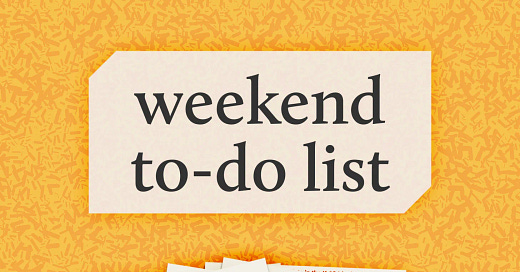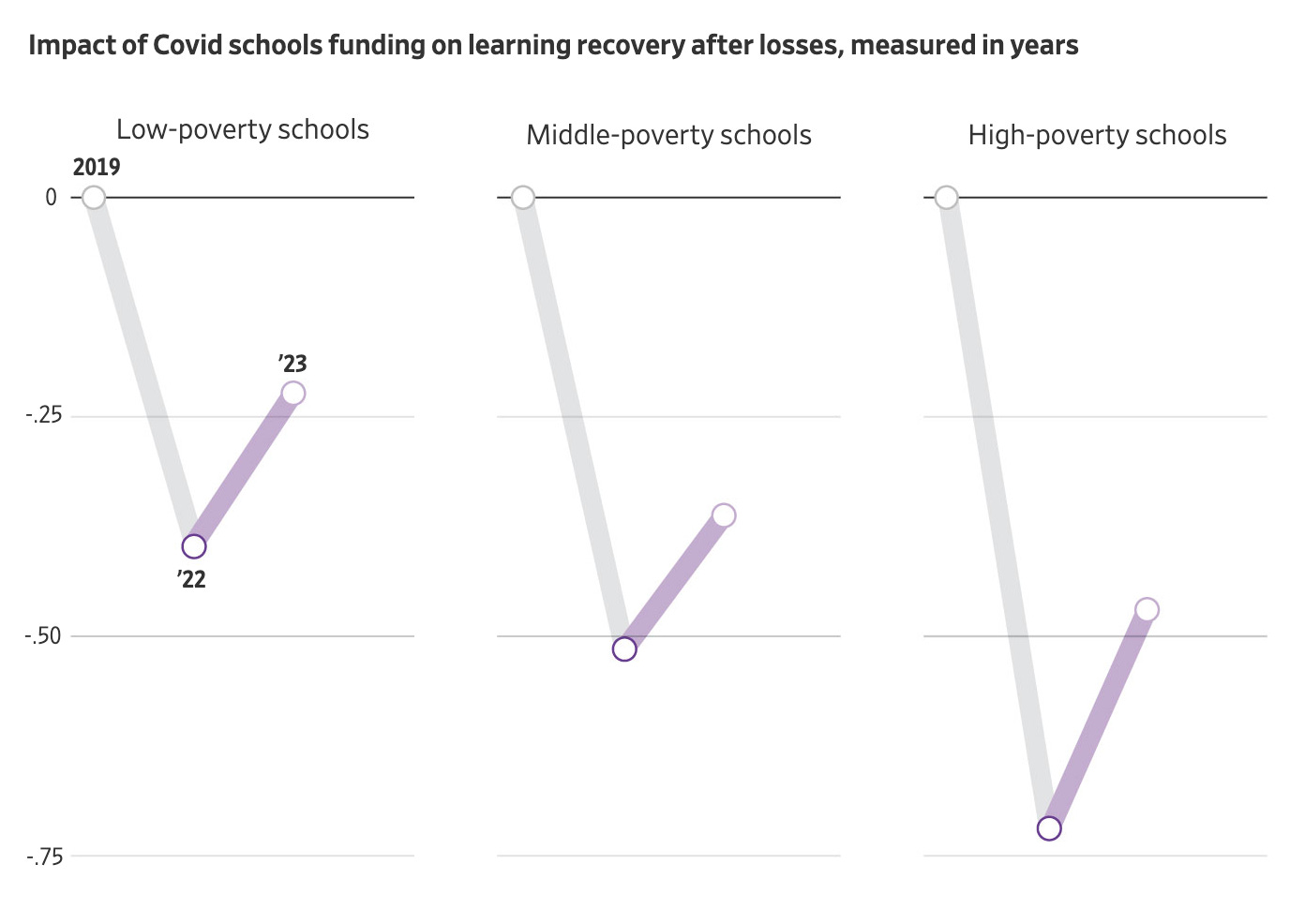1. Students to Schools: Do Better
READ: Schools continue to miss the mark, and students know it. The Walton Family Foundation-Gallup Student Report Card, an annual survey of over 2,000 public and private school students in grades 5-12, found that, for the second year in a row, students would issue their schools an average grade of B-. Not surprisingly, students living in neighborhoods with a lower median income were more likely to give their school a lower grade:
"As we reflect on these findings, it’s evident that our schools are falling short of inspiring and equipping all students, particularly those from lower-income backgrounds, with the tools they need to succeed. This report underscores the urgent need for targeted support and innovation to ensure every student receives a quality education that prepares them for the future," said Edward Hui, Education Program Deputy Director, Walton Family Foundation.
Read more from Joshua Bay at The 74 here.
2. Parents to Schools: What Our Students Said
READ/LISTEN: Students aren’t the only group demanding change from their schools. The National Parents Union released findings from The Parent Report Card, an annual poll of over 1,500 public school parents in grades K-12, which found that only 48% of parents believe their child is definitely prepared academically for the next school year. NPU President Keri Rodrigues called on schools to do more to prioritize communication with families about their student’s academic progress:
“It’s unacceptable that less than half of us parents believe our children are definitely ready for the next school year – and our lack of confidence should be a clear sign that we have a major problem. When schools are failing to honestly communicate with parents, schools are failing kids.”
Read more here, and listen to Keri, Ariel, Bernita, and Tafshier unpack more of the findings on this week’s episode of The National Parents Union Podcast.
3. Good Schools (Of All Kinds) Are the Foundation of Democracy
READ/LISTEN: Chad Aldeman took to the pages of The 74 to argue that our current conception of public education is outdated and that maintaining or strengthening democracy in the U.S. requires an embrace of education pluralism, from expanding public school choice to improving educational choice programs for private schools and other school models:
Cheerleading for the current education system is probably not the best way to strengthen democracy. For example, a recent study found that private school students actually had more political tolerance, political participation, civic knowledge and skills, volunteerism and social capital than those in public school. Charter schools that do a particularly good job boosting noncognitive skills also seem to raise voter participation rates more than other schools do.
In other words, the best way for education to boost American democracy may be for policymakers to support good schools, regardless of sector.
Read more here. I also spoke with Derrell Bradford this week about how the rise of education pluralism could revolutionize education. Listen to our conversation on Lost Debate here.
4. Did the $200 Billion Help?
READ: Were U.S. schools able to effectively leverage the nearly $200 billion in Covid-related aid they received from the federal government? Matt Barnum and Rosie Ettenheim reported on new findings that suggest the results have been middling at best:
The work is not done, and it won’t get easier as schools face an uncertain fiscal reality with ESSER relief funding set to expire this fall. Read more in the Wall Street Journal here.
5. It’s Time to Focus on the Kids, Not the Vibes
READ/LISTEN: Tim Daly reflected on the “belated acknowledgment” that schools should have returned to in-person learning much sooner than they did during COVID. He makes the case that keeping schools closed longer than necessary was just one in an embarrassingly long chain of vibes-based decision-making in education:
This was not an anomaly. We struggle to make good decisions more broadly. We pay lip service to doing things that are “data driven” and “evidence-based,” but our track record suggests we rely more on vibes.
Research had shown for decades that there were problems with balanced literacy as a strategy - particularly for struggling readers. But districts adopted it in huge numbers and made heaps of money for publishers and celebrity academics. Why? [Vibes](https://www.newyorker.com/news/annals-of-education/the-rise-and-fall-of-vibes-based-literacy).
Vibes told us to take a hands-off approach to student absenteeism following the pandemic - we didn’t want to come down too hard on anybody - and it bit us hard when missing school became broadly normalized.
I think it’s inaccurate to say our re-opening process was guided by science. Our north star was vibes.
Read more here. Tim also discussed his piece with Chris on this week’s episode of The Citizen Stewart Show. Listen here.
6. Understanding the Roots of the Academic Crisis
READ: Marianna McMurdock at The 74 reported on new insights from the Annie E. Casey Foundation’s 2024 Kids Count Data Book, which warned that unless the U.S. invests quickly and significantly in academic and social support for young people and their families, and especially young people of color, the country “stands on the precipice of losing our economic standing.” The report found that two in five children have experienced an adverse childhood experience, and an even higher number experience significant housing and economic instability:
“What we’re seeing is many kids don’t have those basics met … Most of the country now accepts that we’re in a reading and literacy crisis but to break down, what does it actually look like and what does it mean? It is particularly alarming,” [vice president of external affairs with the Casey Foundation Leslie] Boissiere said.
Read more here.
7. Oklahoma Will Require Public Schools to Teach the Bible
READ: Sarah Mervosh and Elizabeth Dias at The New York Times reported on Oklahoma Superintendent Ryan Walter’s announcement that the state will now require public schools to teach the Bible, including the Ten Commandments:
Mr. Walters called the Bible “a necessary historical document to teach our kids about the history of this country, to have a complete understanding of Western civilization, to have an understanding of the basis of our legal system.”
“Every teacher, every classroom in the state will have a Bible in the classroom, and will be teaching from the Bible in the classroom,” he said.
Schools have not yet received instructions on the curriculum, and Walters’ authority to issue the directive will likely be contested. Read more here.
Heads up! Imbroglio will take a short break and return in August.






